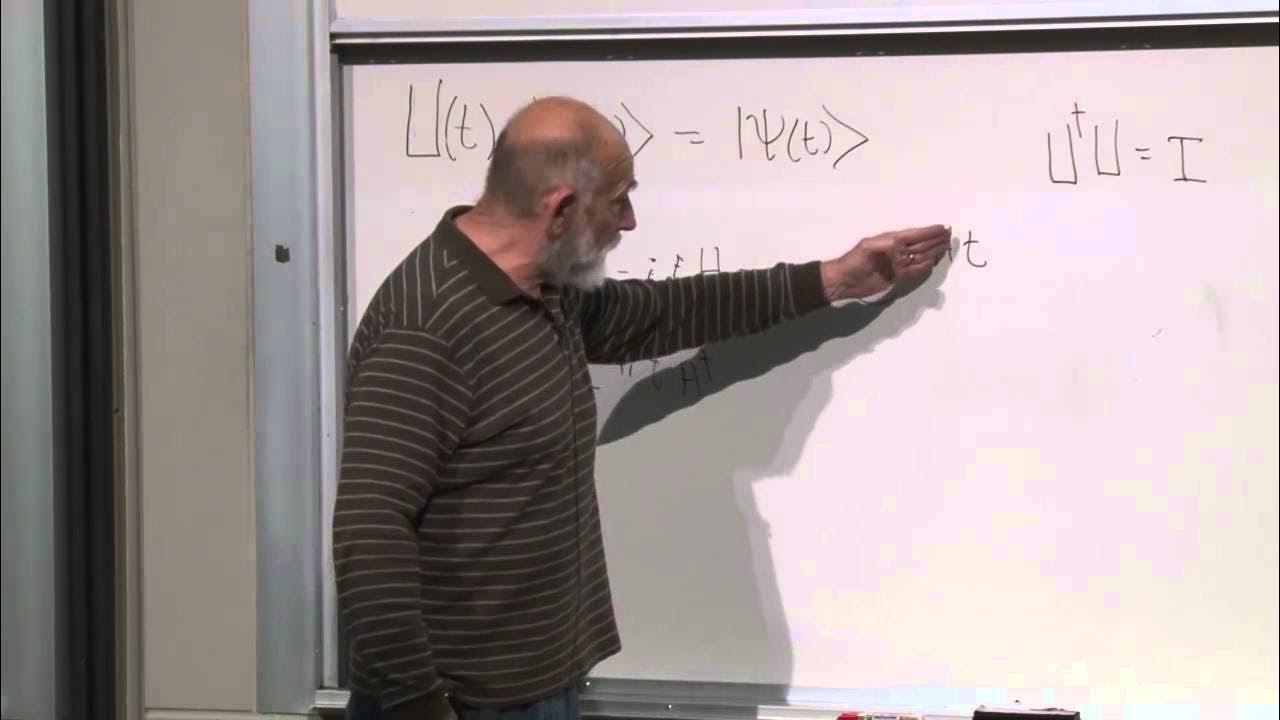Ch 11: What are unitary operators? | Maths of Quantum Mechanics
TLDRThe video script delves into the concept of unitary operators in quantum mechanics, emphasizing their role in preserving the inner product of vectors, akin to generalized rotations. It explains that unitary operators have eigenvalues with magnitude one, reflecting their property of conserving probability, which is crucial in quantum mechanics for maintaining the total probability of a system's state. The script also hints at the importance of unitary operators in deriving the Schrödinger equation and understanding time evolution in quantum systems.
Takeaways
- 📌 Unitary operators are a fundamental class of operators in quantum mechanics related to change.
- 🔍 The inner product of two vectors remains unchanged when both are transformed by a unitary operator U.
- 🧠 Intuitively, unitary operators can be thought of as 'generalized rotations' that preserve lengths and angles between vectors.
- 🔗 Unitary operators are defined by the property that their Hermitian conjugate is equal to their inverse.
- 📈 To demonstrate inner product preservation, the script walks through the process of applying U to both vectors and using the Hermitian conjugate.
- 🌀 Eigenvalues of a unitary operator must have a magnitude of one, which is why they are unit complex numbers.
- ⚖️ Unitary operators are crucial in quantum mechanics because they conserve probability, essential for calculating probabilities in quantum systems.
- 🔄 The conservation of probability by unitary operators implies that the probability of measurement outcomes and the total probability of a state remain unchanged.
- 🕒 Time evolution in quantum mechanics is described by unitary operators, which will be further explored in the Schrödinger equation.
- 🌐 Unitary operators, rotation, translation, and time evolution operators are all expected to conserve probability, maintaining the total probability of 1.
- 📚 The next episode will discuss generators in classical physics and their role in deriving the Schrödinger equation and the momentum operator.
Q & A
What are unitary operators in quantum mechanics?
-Unitary operators are a class of operators that preserve the inner product of two vectors when they are applied to the vectors. They are fundamental to the concept of change in quantum mechanics and are akin to generalized rotations in that they maintain the lengths and angles between vectors.
How is the inner product related to the concept of a unitary operator?
-The inner product, which can be thought of as a generalized dot product, is related to unitary operators because these operators must keep the inner product unchanged when applied to vectors. This property ensures that the lengths and angles between vectors are preserved, similar to how a rotation in three-dimensional space maintains the lengths and angles.
What is the defining property of a unitary operator?
-A unitary operator is defined by the property that its Hermitian conjugate is equal to its inverse. This property is what ensures that the inner product of any two vectors remains unchanged when the operator is applied to them.
How can you prove that unitary operators preserve the inner product?
-To prove this, apply the unitary operator U to both vectors in the inner product, then use the property that the Hermitian conjugate of U is its inverse. By multiplying U with its Hermitian conjugate (which is the inverse), you get the identity operator, thus showing that the inner product remains equal to its original value.
What is the significance of the eigenvalues of a unitary operator having magnitude one?
-The eigenvalues of a unitary operator having magnitude one means that the operator does not change the length of its eigenvectors. This is consistent with the idea that unitary operators are like rotations, which do not alter the lengths of the objects they act upon. It also ensures that the probabilities represented by the eigenvectors remain valid, as the eigenvalues are the scaling factors in the context of quantum mechanics.
Why are unitary operators important in quantum mechanics?
-Unitary operators are crucial in quantum mechanics because they conserve probability. Since inner products are often used to calculate probabilities, and unitary operators preserve inner products, they ensure that the probabilities of measurement outcomes and the total probability of a quantum state remain unchanged under their action.
What transformations in quantum mechanics are expected to be unitary?
-Transformations such as rotation, translation, and time evolution in quantum mechanics are expected to be unitary because they should conserve the probabilities of the quantum states involved. These transformations are essential for maintaining the fundamental probabilistic nature of quantum mechanics.
How does the concept of unitary operators connect to the Schrödinger equation?
-The concept of unitary operators is directly related to the Schrödinger equation because the time evolution operator in quantum mechanics must be unitary to ensure that the probabilities are conserved over time. This will be demonstrated when the Schrödinger equation is derived in the series.
What is the role of generators in classical physics and how does it relate to unitary evolution?
-Generators in classical physics are used to describe infinitesimal changes in the system's configuration. They are relevant when deriving the Schrödinger equation and the momentum operator because they help describe how quantum states evolve over time. The connection between generators and unitary evolution will be explored in the context of the infamous Schrödinger equation in the series.
How do unitary operators act on a normalized eigenvector?
-When a unitary operator U acts on a normalized eigenvector omega, the resulting vector is simply scaled by the corresponding eigenvalue lambda. The inner product of the eigenvector with itself remains one, and since U preserves the inner product, the eigenvalue must have a magnitude of one, reflecting that the length of the eigenvector is unchanged.
What is the fundamental property derived from the unitary operator's action on eigenvectors?
-The fundamental property derived from the action of a unitary operator on eigenvectors is that the eigenvalues of a unitary operator are unit complex numbers, meaning they have a magnitude of one. This reflects the preservation of the eigenvectors' lengths and the conservation of probability in quantum mechanics.
Outlines
🌟 Introduction to Unitary Operators
The paragraph introduces unitary operators as a significant class of operators in quantum mechanics, emphasizing their role in preserving change. It begins by questioning the existence of an operator U that maintains the inner product of two vectors when applied to them, drawing an analogy to rotations in Euclidean space that preserve lengths and angles. The definition of a unitary operator is provided, stating that it is an operator whose Hermitian conjugate equals its inverse. The explanation continues with a proof that unitary operators preserve the inner product, and the concept is reinforced with the intuitive notion of 'generalized rotations'. The paragraph concludes by highlighting the fundamental property that the eigenvalues of unitary operators are unit complex numbers, indicating that they do not alter the length of their eigenvectors.
🔄 Unitary Operators in Quantum Mechanics
This paragraph delves into the importance of unitary operators in quantum mechanics, particularly in relation to the conservation of probability. It explains that since inner products are commonly used to calculate probabilities in quantum mechanics, unitary operators, which preserve inner products, also conserve probability. The discussion includes potential applications of unitary operators, such as rotations, translations, and time evolution of quantum states. The paragraph suggests that these transformations should all be unitary to ensure that the total probability remains constant. It also mentions an upcoming episode that will explore the derivation of the Schrödinger equation and prove the necessity of unitary time evolution. The paragraph ends with a brief mention of the next topic, which will be generators in classical physics and their connection to unitary evolution.
Mindmap
Keywords
💡Quantum Operators
💡Unitary Operators
💡Inner Product
💡Hermitian Conjugate
💡Eigenvectors and Eigenvalues
💡Probability Conservation
💡Quantum Mechanics
💡Rotation
💡Time Evolution
💡Schrödinger Equation
💡Lagrangian Framework
Highlights
Unitary operators are foundational to the concept of change in quantum mechanics.
Unitary operators preserve the inner product of two vectors, maintaining the lengths and the angle between them.
The transformation that preserves the inner product can be thought of as a simple rotation.
A unitary operator is defined as an operator whose hermitian conjugate is equal to its inverse.
The property of unitary operators implies that the inner product remains equal to its original value after the application of the operator.
Unitary operators are intuitively seen as 'generalized rotations' that preserve lengths and angles.
Eigenvalues of a unitary operator must have magnitude one, also known as unit complex numbers.
Unitary operators do not change the length of their eigenvectors, which is why their eigenvalues have unit length.
Unitary operators are crucial in quantum mechanics as they conserve probability.
In quantum mechanics, inner products are often used to calculate probabilities, and unitary operators ensure that these probabilities are conserved.
Transformations like rotation, translation, and time evolution in quantum mechanics are expected to be unitary to conserve probability.
The Schrodinger equation and the momentum operator will be derived in future episodes, highlighting the importance of unitary operators.
The next episode will discuss generators in classical physics and their role in deriving the Schrodinger equation and the momentum operator.
Unitary operators are fairly simple and intuitive, forming the basis for deriving the Schrodinger equation.
Transcripts
Browse More Related Video

Lecture 8 | Quantum Entanglements, Part 1 (Stanford)

Ch 8: Why is probability equal to amplitude squared? | Maths of Quantum Mechanics

Advanced Quantum Mechanics Lecture 1

Lecture 5: Operators and the Schrödinger Equation

Ch 14: Where does the momentum operator come from? | Maths of Quantum Mechanics

Supersymmetry & Grand Unification: Lecture 4
5.0 / 5 (0 votes)
Thanks for rating: